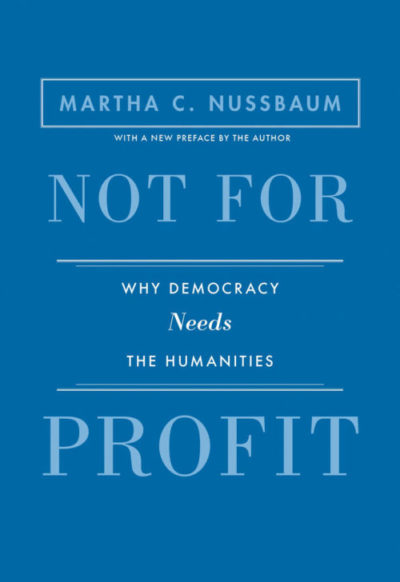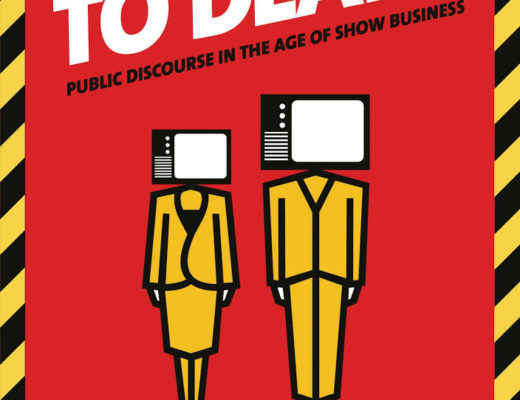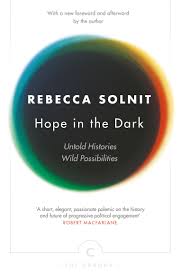Being a democracy is one thing which makes most Indians very proud of. This is all the more important when we realize that most of the countries do not even have a remote idea of what a democracy is. There are kings, dictatorships and military rules. Crores of people have never voted in this world. Being an Indian, we may never be able to imagine what it is like living under a dictatorship. Now the next question is, what kind of a democracy we should be aiming for? There are democracies which have elections but nothing else. Democracy is much more than elections. It’s not replacing one feudal system with another. Democracy is compassion, democracy is debate, its accommodation, its diversity. What is the essential toolkit in a democracy? What skills of citizens build a vibrant democracy? What kind of education brings up citizens who can be torchbearers of a vibrant democracy?
In this post, let me introduce a book which discusses many of these questions in details. “Not for profit, why democracy needs humanities” by renowned American philosopher Martha Nussbaum is a very important book for our times. Published in 2010, this book raised very important questions concerning education and democracy. When our democracies are at crossroads and when they often appear so fragile Martha’s book is hugely relevant and an essential reading by all citizens.
To begin with, Martha raises the most important question of the purposes of education as something more than an enterprise of knowledge. She links the idea of education to the cultivation of a total human being and democracy. The backdrop of this book is a worldwide decline in the studies of humanities. Suddenly we find the separation of useful and useless knowledge and studies of arts and humanities become associated with useless knowledge which apparently provides no benefit to the learner or the state. This trend, for which we have data available is a disturbing one. Martha argues that there is more to education than as a measure of profit. Education is not mere collection of information. In the course of the book, she develops the powerful argument that the studies of humanities is vital to a thriving democracy. In fact without such an education democracy withers. The book opens the all-important debate about what an ideal democracy can be.
Martha focuses America and India mainly in the book. Both are large democracies and hold a mirror to us in discussing democracy itself. It will be worthwhile to deal briefly with some of the major ills of democracy in our country as we are more familiar with it. As we have seen at the beginning, democracy is not just elections every five years. The hallmark of a great democracy is the freedom to question, freedom to debate and the freedom to pursue each individual lives in total liberty. Democracy is not something pushed from up but something which people do collectively. It’s building up an equitable society. It’s respect. When we look around, these are some of the values which face various threats. No story of Indian democracy can be written without mentioning the dangerous interplay of caste and religion and money.
Martha argues that education is not a passive assimilation of facts but challenging mind to be competent, active and thoughtfully critical. It is the nurturing of human consciousness. Here we aim to create a man who can think, reflect, argue, and debate and all this without deferring to the authority. With a mind-blowing diversity of caste, religion, and language, democracy is a tedious idea to negotiate and practice. Often, political parties resort to manipulative polarization to garner votes by dividing the people. Though minority rights are enshrined in the constitution, unless we have people who are committed to the ideals of the constitution, minority rights and safety remains vulnerable. John Stuart Mill will speak about the right of one man out of the entire mankind to hold a different opinion. That’s the ideal we aim for. In this book, this is precisely the dream of Nussbaum. She asserts the ability of humanities to instill a sense of compassion towards the other. According to her, we must cross the boundaries of race, religion, and gender. For Martha, there is no democracy without moral emotions such as respect, concern, and compassion. In a democracy, one should be able to think from the shoes of the other.
Nussbaum devotes an entire chapter to discuss the importance of argument in a democracy. She writes,
the ability to think and argue for oneself looks to so many people like something dispensable if what we want are marketable outputs of a quantifiable nature.
Beginning with the Socratic ideal of argument, Nussbaum goes on to discuss the severe strain for arguments now. The Socratic critical enquiry is unauthoritarian and what matters is not the status of the speaker but the nature of the argument. In India, of late we are too familiar with the low level of political debates. We are living in an age when people are too gullible and perhaps this can be traced to the retreat of the culture of questioning and debate. How accommodative are we to dissent? Is there a democratic space for that?
In the course of the book, Nussbaum takes us to what is called the project of making the world citizens. The cheer for the inclusive world is becoming feeble day by day. Worldwide, there is a backlash against diversity, inclusiveness, and accommodation. Protectionism is gaining ground at many places. Conservative nationalist parties are winning elections. There are many who peddle in fear. In this background, Nussbaum brings us the essential attitude of a humanities student who develops the capacity to view the entire world as one. Here culture, geography or history do not divide people but unifies them. Towards the end of the book, Nussbaum takes us to another essential skill which humanities equip us with. The power for narrative imagination. This is what enables us to go beyond knowledge and logic. This is what helps us to come out of our narcissistic cocoons and develop sympathy. We see the human being who cannot be confined to data.
This is an extremely important book for all. For the humanities student, it helps him/her to reinforce their convictions. For the non-humanities students, it opens up a new world where they meet what is not quantifiable and measurable. For all believers in democracy, it is a blueprint for a working democracy and hope. The time has come to infuse the fresh air of sympathy, open debate and critical questioning on our campuses. And for that to happen, we must allow the flowering of humanities and social sciences in our campuses along with technical or management education. For those who are interested in the plight of liberal arts worldwide and a powerful case for it, I would also recommend a book by the celebrated columnist of Time magazine Fareed Zakaria titled “ In defense of a liberal education.” (This I hope to read soon and come back later )






No Comments